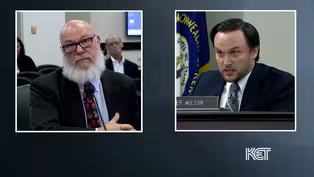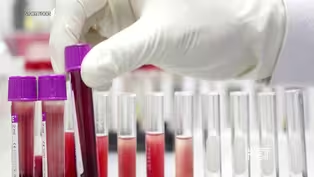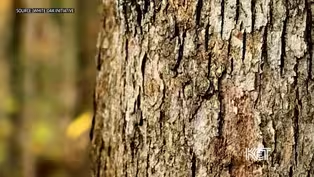
Minority Mental Health Awareness Month
Clip: Season 3 Episode 42 | 3m 30sVideo has Closed Captions
Month dedicated to raising awareness about minorities and mental health issues.
Jasmine Bridges, a clinicial with the University of Louisville Health's Peace Hospital, discusses minorities and mental health, the obstacles they face when seeking treatment, and how Olympian Simone Biles has helped bring awareness to the issue.
Problems playing video? | Closed Captioning Feedback
Problems playing video? | Closed Captioning Feedback
Kentucky Edition is a local public television program presented by KET

Minority Mental Health Awareness Month
Clip: Season 3 Episode 42 | 3m 30sVideo has Closed Captions
Jasmine Bridges, a clinicial with the University of Louisville Health's Peace Hospital, discusses minorities and mental health, the obstacles they face when seeking treatment, and how Olympian Simone Biles has helped bring awareness to the issue.
Problems playing video? | Closed Captioning Feedback
How to Watch Kentucky Edition
Kentucky Edition is available to stream on pbs.org and the free PBS App, available on iPhone, Apple TV, Android TV, Android smartphones, Amazon Fire TV, Amazon Fire Tablet, Roku, Samsung Smart TV, and Vizio.
Providing Support for PBS.org
Learn Moreabout PBS online sponsorshipWell, July is Minority Mental Health Awareness Month, a month dedicated to bringing awareness to the unique challenges that racial and ethnic minorities face in the U.S. when it comes to mental illness.
According to a report by the Food and Drug Administration, fewer than one in two African American adults got mental health care in 2020.
It also found that Asian Americans were 60% less likely to receive mental health treatment than non-Hispanic whites.
Jasmine Bridges with U of L Health Peace Hospital, a behavioral health hospital, says minorities often face greater obstacles than whites when it comes to seeking treatment for mental health issues.
I think it's important for us to recognize minority mental health moms because for decades and still, even to this day, there really is a stigma surrounding mental health services and mental health support.
Yes, this stigma crosses various cultural backgrounds, but specifically regarding African-Americans, historically, we didn't always seek mental health support from what we call professional.
We didn't lean on more So each other family, the church or other spiritual or religious affiliations.
So I think it's important for us to continue to have these open and honest conversations that kind of help remove that stigma so that people who are struggling from abuse, struggling with alcohol and other substances so that they see that, number one, it's safe to seek help.
It's okay to seek help, and we're here to help you.
So I think that's one of the reasons why it's important.
Mental health can be in these things from what's going on within your head, things like anxiety, stress, depression.
We talk about you know, bipolar disorder, schizo psychosis or schizophrenia and also using substances, being addicted to something that affects your ability to maintain yourself and care for yourself or care for others.
And also looking at just where you are in society, Do you live in a specific area with a lot of poverty or violence or crime or what's going on around you?
Bridges also says when it comes to speaking up about minority mental health, representation matters.
She commended Olympic gold medalist gymnast Simone Biles, who had openly struggled with her own mental health after pulling out of the Tokyo Olympics because of a mental block.
But I'm glad she decided to do that for a single, because I think it will help other people and other young girls, black girls especially.
I mean, you know, black females, ninth through 12th grade, had 60% higher suicide attempts than white females, according to the Office of Minority Health.
So we need to be having those conversations.
We need to be having them in schools and for someone like some someone who looks like us to make that decision, I think absolutely it will help.
Biles is competing in the Paris Olympics, where today, by the way, she and the U.S. women's gymnastics team won team gold.
Cabinet Leader Says Funding Shortfall Stopping SB151
Video has Closed Captions
Clip: S3 Ep42 | 3m 14s | Cabinet leader says budget shortfall means kinship care law cannot be carried out. (3m 14s)
Headlines Around Kentucky (7/30/2024)
Video has Closed Captions
Clip: S3 Ep42 | 1m 59s | A look at stories making headlines around the state. (1m 59s)
Lexington Lands $500,000 "Everyone Counts" Grant
Video has Closed Captions
Clip: S3 Ep42 | 1m 32s | Lexington getting $500,000 for program focused on disrupting gun violence in the city. (1m 32s)
New Study Shows Accuracy of Alzheimer's Blood Test
Video has Closed Captions
Clip: S3 Ep42 | 2m 25s | Louisville doctor on study showing accuracy of simple blood test to detect Alzheimer’s. (2m 25s)
Video has Closed Captions
Clip: S3 Ep42 | 3m 35s | The effort to protect the white oak tree and Kentucky bourbon barrels. (3m 35s)
Providing Support for PBS.org
Learn Moreabout PBS online sponsorship
- News and Public Affairs

Top journalists deliver compelling original analysis of the hour's headlines.

- News and Public Affairs

FRONTLINE is investigative journalism that questions, explains and changes our world.












Support for PBS provided by:
Kentucky Edition is a local public television program presented by KET




